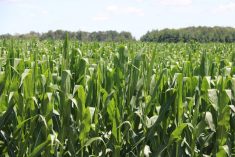Chicago | Reuters — The U.S. Department of Agriculture (USDA) will no longer regulate a genetically-modified corn developed by Monsanto to resist dicamba herbicide, the agency said on Wednesday.
The move by the agency’s Animal and Plant Health Inspection Service (APHIS), means it can now be planted without permits or any additional regulatory oversight from the agency.
Monsanto and other agricultural chemical companies produce seeds with built-in resistance to their weedkillers so that spraying with the chemicals does not destroy crops.
The corn line, known as MON87419, also resists glufosinate herbicide, USDA said in a statement on its website.
Read Also

More canola, spring wheat likely to be seeded this spring
As spring planting approaches, farmers are busy planning which crops to seed this year and how much. With that, market thoughts have turned toward planted area projections, as Statistics Canada is set to issue its report on Thursday.
The Canadian Food Inspection Agency granted approvals for MON87419 for environmental release and use in livestock feed in late January. Health Canada granted food safety approval for the corn last month.
Monsanto wants to use dicamba to diversify and provide long-term growth as its long-running glyphosate herbicide faces competition from generic products. In addition, the widespread use of glyphosate has contributed to the rise of weeds resistant to it and farmers are seeking alternatives.
USDA also extended deregulation of Syngenta’s MZIR098 corn, which is genetically engineered for both insect resistance and glufosinate-ammonium resistance.
A public comment period closed Jan. 23 on Syngenta Canada’s application for CFIA and Health Canada approvals on MZIR098.
— Reporting for Reuters by Jo Winterbottom.















